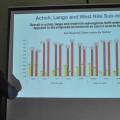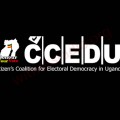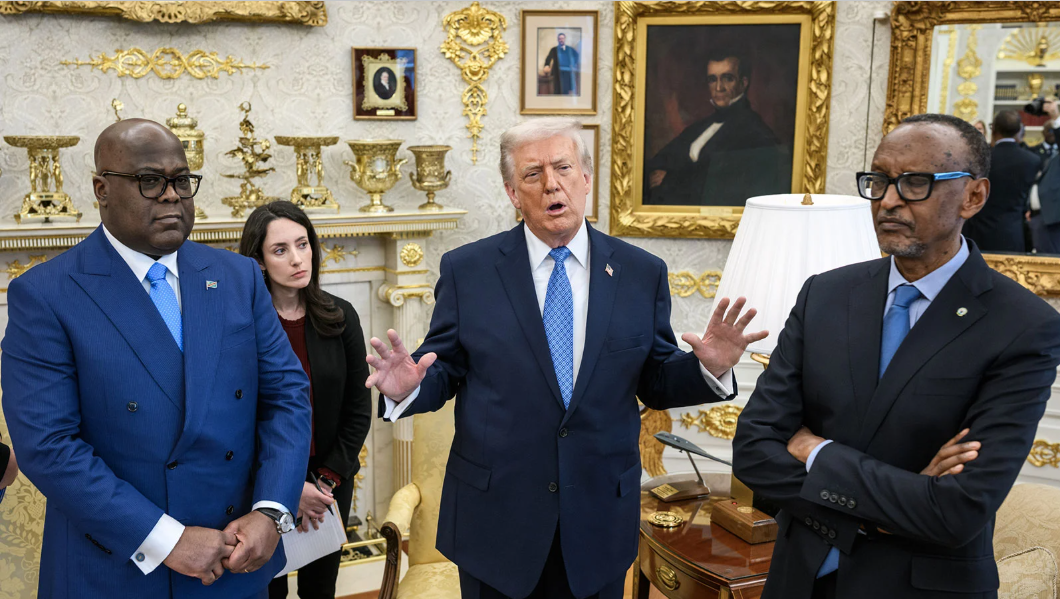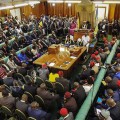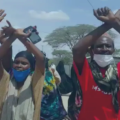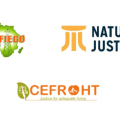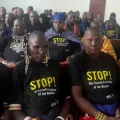By witnessradio.orgTeam
A new survey conducted by civil society organizations shows that many Members of Parliamentare likely to defy their constituents and back constitutional amendments to article 102[b] of the constitution that provides a seal of 75 years for anyone vying for the position of presidency.
The study shows that out of the 436 Members of Parliament, 276 MPs support the bill, 116 detest it while 38 MPs are undecided.
This is contrary to what the electorates hold with 85% of them against the same bill supported by their representatives.
Releasing the findings from the survey, the executive Director, Great Lakes Institute for electoral Democracy said that many MPs are not representing what their voters believe in and have gone on to lie that their voters are pro- the amendments.
For Instance in the Buganda region in Nakifuma County, Bukuya County, Busiro Country North, Nansana Municipality, Budyebo County, Mukono county North, Mityana county North, Mawokota County North and Bukoto South, the constituents are clearly opposed to the bill but the representative MPs are in full support of the same bill.
In other constituencies, the voters openly opposed the bill but the respective MPs are not decided. This is seen in Nakaseke North County, Buwekula and Bukomansimbi North.
In the survey released last week by Uganda Governance Monitoring Platform and Citizens coalition on Electoral Democracy showed that 66% of Ugandans in the Buganda are opposed to the bill. This is far higher than the 44% MPs from the same region that are expected to vote against the bill in the latest findings on the voting patterns of MPs on the constitutional amendments.
Reacting to the number of undecided MPs, Program director HURINET Uganda, Patrick Tumwine said that this could be a trick by the MPs to eat big from the amendments. “We need to interrogate more the undecided MPs, they could be waiting for the pay cheque to go up and hence rising their price”.
The contradicting figures are not only seen in the Buganda region, in other regions like the Ankole region, only two MPs from Buhweju and Kajara counties are voting in line with what their constituents believe in. Some of the MPs who are expected to vote against what their constituents say include those from Bukanga North, Ibanda North, Ibanda South, Igara West where the mover of the private members bill on the amendments hails from, and Isingiro North and South constituencies.
In Acholi Sub-region, Former stalwart and Woman MP Beatrice Anywar is in support of the amendments that will see president Museveni , she has always opposed seeking another term.
Anywar contradicts her constituents together with the MPs from Agago County, Chua East, Lamwo and Omoro counties who are also in support of the bill.
In Busigu region where voters strongly opposed the amendments, some MP are voting otherwise with five MPs from Bubuulo East and West, Budadiri East, Bungokho and Bulambuli supporting the bill.
In Busoga where almost 95% opposition to the bill was recorded, only two MPs are opposed to the bill, while in Karamoja only one MP is opposed to the amendments.
Reacting to the results from the survey, the executive Director, Center for constitutional governance, Sarah Bireete said that even if the bill passes, it will not stop Ugandans from changing power.
“If the bill passes, it will be the beginning of a longer battle to change presidency, we are likely to go the usual way or the Senegal way …” Bireete said. She adds that “Ugandans are not short of options, they have changed presidents 11 times, none of them has ever left following the constitution”.
Political analyst, Imam Kasozi said it was unfortunate that more people are supporting the bill. “More poor people surprisingly supporting the bill, have they been promised money?”. Imam Kasozi asked.
The report comes as Parliament is expected to receive a report from the parliamentary and legal affairs committee after consultations from the different stakeholders.


 MEDIA FOR CHANGE NETWORK2 weeks ago
MEDIA FOR CHANGE NETWORK2 weeks ago
 FARM NEWS2 weeks ago
FARM NEWS2 weeks ago
 MEDIA FOR CHANGE NETWORK1 week ago
MEDIA FOR CHANGE NETWORK1 week ago
 MEDIA FOR CHANGE NETWORK1 week ago
MEDIA FOR CHANGE NETWORK1 week ago
 MEDIA FOR CHANGE NETWORK4 days ago
MEDIA FOR CHANGE NETWORK4 days ago
 MEDIA FOR CHANGE NETWORK6 days ago
MEDIA FOR CHANGE NETWORK6 days ago
 MEDIA FOR CHANGE NETWORK3 days ago
MEDIA FOR CHANGE NETWORK3 days ago
 MEDIA FOR CHANGE NETWORK2 days ago
MEDIA FOR CHANGE NETWORK2 days ago

